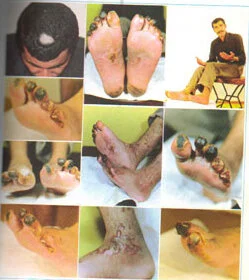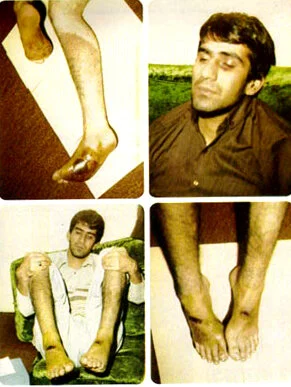No one shall be subjected to torture...
Torture, both physical and psychological, has been a matter of routine and a common practice in the prisons of the Islamic Republic. Many methods of physical torture and ill-treatment have been described by former prisoners. One example is the blindfolding of detainees, binding their wrists and pushing them violently from one guard to another, while kicking, punching and beating the victim indiscriminately all over the body. Many suffer from various kidney disorders due to these beatings and many more have been scarred for life due to wounds sustained through various other forms of torture, such as applying lighted cigarettes to burn the body and the removal of the toe nails.
Beating and suspension are the forms of torture most often used in the prisons of the Islamic Republic.
"The Revolutionary Guards put me in handcuffs which got tighter as I moved my hands. They were fastened behind my back, diagonally, one arm stretched over the shoulder and the other under.... They suspended me from a hook on the wall with only the tips of my toes touching the ground... My feet had also been beaten and they were swollen and very painful. Gradually, as my legs became tired, my body slumped down and the pressure on my shoulders began. This happens after only a few minutes..." from a man who was arrested at his home and taken to prison in Tehran.
Beating is usually on the back, from the nape of the neck to the back of the thighs, and on the soles of the feet.
"They blindfolded me and wrapped a blanket around my head, so I could see absolutely nothing. The lashes tore into the flesh on the soles of my feet, and I lost consciousness several times..." from a 16 year old girl who was taken to Evin prison for interrogation.
Sexual abuse of both male and female prisoners, including rape, is also practiced widely in the prisons of the Islamic Republic. Young women prisoners have been forced into temporary marriages with the members of the Revolutionary Guards and have subsequently been raped the night before their execution. This is being done because it is written in the Koran that the soul of virgins will go to heaven, hence the practice of temporary marriage and rape before execution in order to avoid sending the victim to heaven. Furthermore, in compliance with Islamic rules and values, the families of the young victims of rape and murder will also have to suffer the additional burden of accepting the "bride money" from the hand of the same Islamic Guard who was responsible for the raping and the killing of their daughter. The wives and the daughters of the male prisoners have also been victims of "temporary marriages" and rape by the Islamic Guards. The Guards themselves have often boasted about such acts to the male prisoners.
The other forms of torture that have been committed by the Islamic Republic include the infliction of psychological suffering by carrying out mock executions and by forcing prisoners to witness the torture and execution of their close relatives or political colleagues.
"They took me to a yard where there were four wooden posts in a semi-circle, and they tied each of us to a post. The first was a boy of 14 or 15, a member of the Mojahedine organization. The second was an army officer and the third, aged about 23, was a member of Paykar. I was the fourth. The time before, when they asked if I had a last wish, I asked them to remove my blindfold, so this time they did not blindfold me. I saw the bullet hit the boy and the officer was hit in the stomach. The Peykar man may already have been dead, his body didn't react to the bullet. The young boy was shaking violently with a bullet in his body. His hands were tied and he was trying with all his might to free himself. He was bleeding profusely. I shouted "what are you waiting for? Why don't you shoot me?" They laughed, and I could do nothing. The young boy died, then the officer. I had just stood there and watched them suffering..." From a prisoner who described his experience in the prison of the Islamic Republic.
More often than not, these psychological and physical tortures are followed by the death of the victims. Sometimes the victims suffer death under torture. At other times, however, the victims are killed after lengthy sessions of torture, simply because the practice does not yield the anticipated results to the revolutionary guards. A young woman prisoner, for example, who had been imprisoned in Shiraz on the ground of being a Bahaie that refused to recant her faith, was taken by the Islamic guards to see the tortured body of her dyeing husband, who was also refusing to renounce his faith. Having suffered all the agony and torture because of their refusal to renounce their faith, the husband and wife were both executed by the Islamic Republic.



